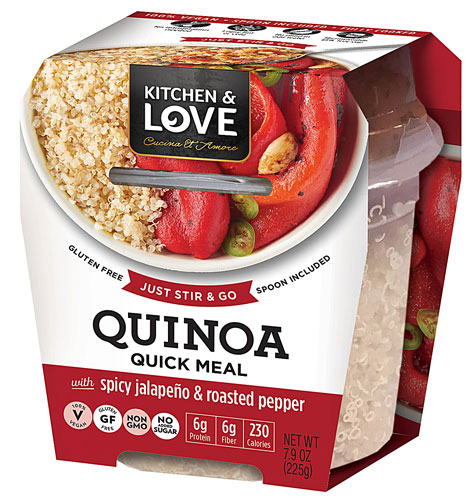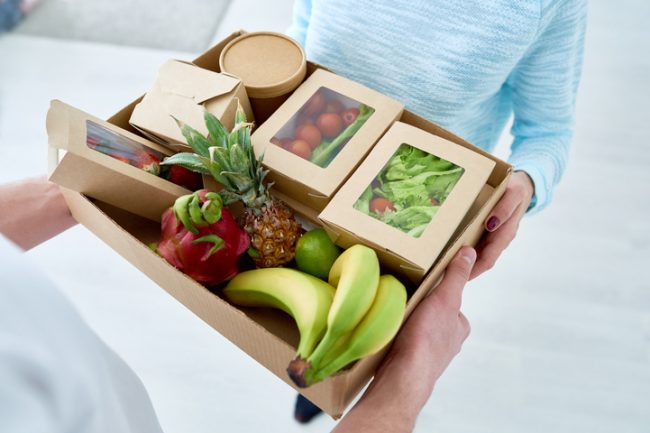For now, home-delivered meal kits represent just a sliver of the U.S. food industry.
Consumer research firm Pentallect says less than 4 percent of American households it surveyed had tried a meal kit in the previous 30 days, but about one-fourth of households expressed interest in trying one of the kits. Pentallect predicts the $2.2 billion meal-kit business in the U.S. will grow 25 percent to 30 percent over the next five years, meaning that more of us will be forking over cash for these time- and hassle-saving creations.
Companies with names like Blue Apron, Green Chef, HelloFresh, Home Chef and Purple Carrot sell these kits, and Amazon.com is making noise about entering the meal-kit market. In these kits, you’ll find recipes and properly portioned ingredients that enable you to whip up a meal in your kitchen.
So, do the pros of these kits outweigh the cons? All in all, nutrition experts give a thumbs-up to home-delivered meal kits, but there are some ingredients of this product that they find a bit distasteful. What follows are some of the pros and cons of meal kits.
Pros
Simplicity
Generally speaking, meal kits contain all the ingredients and directions you’ll need to fix a meal.
“Instructions for prep are very clear, and you can use the instructions to prepare the meal again on your own with ingredients you buy, so it’s almost a cookbook of sorts, only with pictures and complete instructions,” says registered dietitian Keith-Thomas Ayoob, associate clinical professor at the Albert Einstein College of Medicine in the New York City borough of the Bronx.
Portion control
Since the portions are already determined, meal kits can help you better control how much you eat, nutrition experts say.
Registered dietitian nutritionist Rebecca Scritchfield, author of Body Kindness, says the ability to control portion size and ingredient quality are two key factors that influence your intake of fruits and vegetables, along with your balance of nutrients.
Nutrition
In assessing the offerings from five meal-kit services, Reviewed.com notes the average calories per meal ranged from 600 to 700.
“Overall, they are great for those that I trying to eat healthier,” says Dr. Scott Schreiber, a chiropractic physician who’s a certified nutrition specialist and a licensed dietitian nutritionist. “They reduce the amount of times that you eat out, which saves money and uses less unhealthy ingredients like salt and sugar. They also use fresh ingredients, which are more nutritious.”
Special considerations
All five of the meal-kit services examined by Reviewed.com offered both vegetarian and gluten-free options.
“If families have food allergies or intolerances, some of the programs allow you to make sure they are free of the allergens, Scritchfield says.
Variety
Meal kits let you explore types of cuisine that you haven’t sampled before.
“People tend to eat the same thing and get in ruts,” registered dietitian Julie Upton says. “Meal kits break you out of that, and you try a lot of new foods and dishes that you probably would have never eaten otherwise.”
Cons
Cost
Pentallect says meal-kit services cost about $10 per person for each meal — at least $7.50 per person less than dinner at a full-service restaurant, including tax, tip, parking and other costs. So on that note, home-delivered meal kits sound appetizing.
However, a meal kit — while less expensive than dining out — still costs more than buying food at the grocery store and preparing it at home.
Registered dietitian Lisa Hugh warns that meal kits can be a waste of money if you don’t wind up cooking the food or don’t find the meals to your liking.
Ingredients
“My main concern is not all of the services source high-quality ingredients like organic produce and organic and grass-fed meats, so I always suggest using the ones that do,” says certified health coach and nutritional consultant Jared Koch, founder of CleanPlates.com.
“With any meal or meal kit, the nutritional value has a lot to do with where the food is sourced and the specific ingredients used in a particular dish,” he adds.
Meal size
A typical meal-kit dinner in the 600- to 700-calorie range might meet the nutritional needs of a lot of people. But for an active man, for instance, that might not be enough calories.
“Then you feel that you’ve paid for a meal that didn’t fill you up,” Ayoob says.
Annoyance
“Signing up for a plan may be good for a while, but it can become tiresome after awhile. It’s not likely people will do this for months and months on end. There’s often an endpoint,” Ayoob says.
Health coach Liza Baker says that in working with her clients, she recommends leaning on meal kits as a temporary “crutch” when they’re learning how to plan meals and cook from scratch.
Environmental concerns
“Critics are alarmed by the extensive packaging required to ship and insulate individually wrapped ingredients, not all of which is recyclable,” USA Today says.
Until meal-kit providers figure out how to reduce the waste generated by their kits, Baker says she can’t view them as a viable option for daily nutrition.




